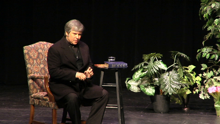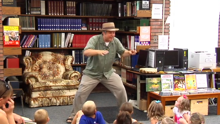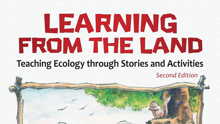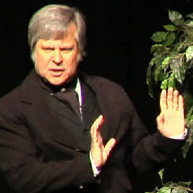"Steamboat a comin'! Steamboat a comin' to town!"
Black smoke belched into the sky as a distant chant echoed off the bluffs of the river valley. Excited children ran to the water's edge as the steamboat pulled alongside the riverbank. Wooden gangways began to lower to the damp shore. Mud squished between the kids' toes as they watched the planks thud to the ground. Try as they might, they couldn't stay clear of the roustabouts unloading several tons of goods for the village merchants. This was a town event.
And that was a way of life in the 1800s up and down the Illinois River that would otherwise be forgotten if it wasn't for storytellers. In olden days the storyteller sat beside the king's throne. While it is no longer a royal duty, storytelling is still a record of our heritage and a way of painting a picture of times gone by. The artist brushing the details of the aforementioned story onto the canvas of our minds is Brian "Fox" Ellis. He likes telling stories about boats and ships because his boyhood playground was a marsh between the Maumee and Ottawa Rivers, and his father worked at a shipyard in Toledo, Ohio.
But it wasn't his dad who taught him the art of storytelling. His grandmother told stories of the family's past, including his Cherokee bloodlines. It stirred an interest in the family ancestry—an interest so strong that he went to Germany to study heritage. Upon his return he befriended an elder of the Chippewa tribe who introduced him to "medicine wheel" gatherings, where Native Americans tell stories of the past. It was here that Ellis discovered Native American ceremony and history—and his name. You see, as a child Brian Ellis raised a pet fox. This provided the background for a story he told at one of the "medicine wheel" gatherings. A fellow participant, Dave Sharpe, curtly responded to the story by saying, "Brian, you are Fox." A few nights later, in a dream as real as life, Brian embraced a fox as it jumped into his arms. The fox became part of Brian, and when he awoke he knew his name.
Teaching Started His Storytelling
Ellis began telling stories as a schoolteacher. His students weren't grasping the concepts he was teaching until he put them in story form. "They liked it because it was fun and important. If it was just important, they wouldn't get the impact," he recalls. Since then Ellis has developed a repertoire of more than 300 stories he tells to kids and adults. The stories come from a variety of sources. Some are from his life experiences; others come from listening to other storytellers. "It's important to be a good listener to be a good storyteller," he points out. "It's okay to borrow because it's an oral history. We don't own the story, we just share it with others." He offers a specific location as his third source for stories. The address is simply 398.2. If you know your Dewey Decimal System, that's where you'll find folklore and fairy tales at the library.
Ellis views storytelling as the ability to weave an image for the listener. It may be a personal experience or could be representative of an entire community. In central Illinois the theme quite often focuses on the Illinois River. During the warm months you'll find him aboard the Spirit of Peoria as it winds its way up and down river. The Spirit becomes a time machine as the river bluffs reveal the evolution of this area, from an ocean 350-million years ago to a sheet of ice a mile thick 100,000 years ago. As he verbally illustrates the formation of the Illinois River as the Ice Age ended 10,000 years ago, you can almost see the 16-inch-long fangs on the saber-toothed tigers along the shore or the rounded tusks of the wooly mammoths. "My job is to make the layers of rock along the river bluffs come to life," he says. He isn't relating facts but instead is creating a mental picture.
Ellis most enjoys storytelling when he is in front of school children, such as a recent performance at Henry Grade School. After a story from the distant past, he stops to tell the kids storytelling can be more recent. "Not all stories are long ago and far away. Some happened right here just yesterday," he claims. Getting the kids to recognize a story when it occurs is difficult. He spends the entire afternoon conducting smaller sessions after his morning assembly. He wants the children to learn what a story is but more importantly to use storytelling to learn family history. He wants the students to take pride in their genealogy and the history of their relatives. After all, good stories can come from such events. "My great, great grandmother met Johnny Appleseed," Ellis relates. He doesn't know all the details of the encounter, but he knows how to tell the story.
Keeping History Alive
Ellis feels the rapid growth of the personal computer has restored interest in storytelling. "As communication becomes more impersonal through computers, more people crave storytelling." It harks back to the days and tales of Mark Twain, who used inflections, gestures, and sound effects to accent what the words were saying, making the past come alive. Ellis feels it accurately reflects societal trends. "Storytelling is not fluff on the side. It is the thread that ties together history, the sciences, and much more." An example is the Underground Railroad that brought the slaves of the South to the freedom of the North. No one kept journals about the Underground Railroad because it was so secretive. Storytelling is the only way its history has stayed alive.
To read the story of Peoria's first steamboat arrival gives the reader a limited impression of the event. When Brian "Fox" Ellis tells the story of the initial arrival of the Liberty in 1829, you'll not only remember the details, you'll hear the calliope as she rounds the bend. Oh, how storytelling can make things so real.
Not Always A Storyteller
Brian "Fox" Ellis hasn't always made a living as a storyteller. He held numerous jobs early in life. He seemed to be looking for that singular career when he happened onto the National Storytelling Association convention in Jonesboro, Tennessee. That's where he found scores of storytellers and learned he already had a vocation. "I had been a storyteller for five years before I knew it was a career," Ellis says.
by H. Wayne Wilson,
Peoria Metropolitan magazine
July 2001









